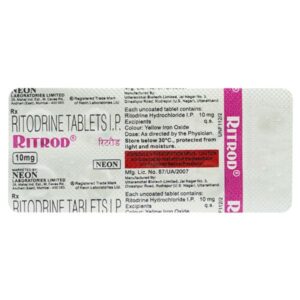RITODRINE
RITODRINE: Ritodrine is a medication primarily used to reduce the contractions of the uterus. It is prescribed to treat preterm labor or to delay premature delivery.
The mechanism of action of ritodrine involves relaxing the smooth muscles of the uterus by stimulating beta-2 adrenergic receptors. It functions as a selective beta-2 adrenergic agonist, which means it mimics the effects of the hormone adrenaline. By activating these receptors, ritodrine causes relaxation of the uterine muscles, thereby reducing the frequency and intensity of contractions.
The dosage of ritodrine is typically determined by a healthcare professional and may vary based on the individual’s condition. It is commonly administered through an intravenous infusion at a starting dose of 50-150 mcg/minute. The dosage can be adjusted according to the response and side effects experienced.
Like any medication, ritodrine can cause side effects which may include increased heart rate, palpitations, tremors, headache, nausea, vomiting, sweating, difficulty breathing, and chest pain. Some individuals may also experience a drop in blood pressure, especially when standing up from a lying or sitting position, which can lead to dizziness or fainting.
It is important to note that ritodrine is contraindicated in certain conditions such as maternal heart disease, uncontrolled hyperthyroidism, diabetes mellitus, and severe hypertension. As it can cause fetal and neonatal adverse effects, including an increased heart rate and reduced blood flow, it should be used with caution during pregnancy.
As with any medication, it is crucial to take ritodrine under the supervision of a healthcare professional and to report any concerning side effects or interactions with other medications.

